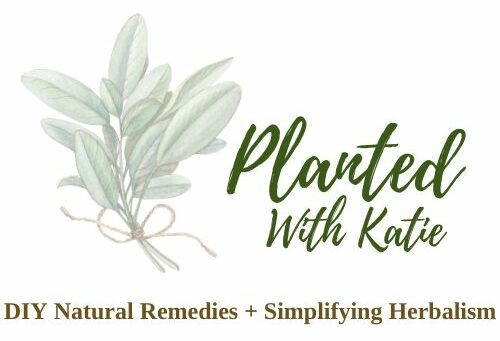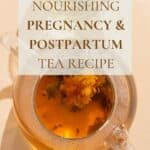Nourishing Pregnancy and Postpartum Herbal Tea Recipe
Pregnancy and postpartum recovery are incredibly special times in a woman's life, but they also bring unique challenges when it comes to health and wellness. A Nourishing Pregnancy and Postpartum Herbal Tea Recipe can be the perfect way to support your body with essential nutrients, helping you feel balanced and strong.
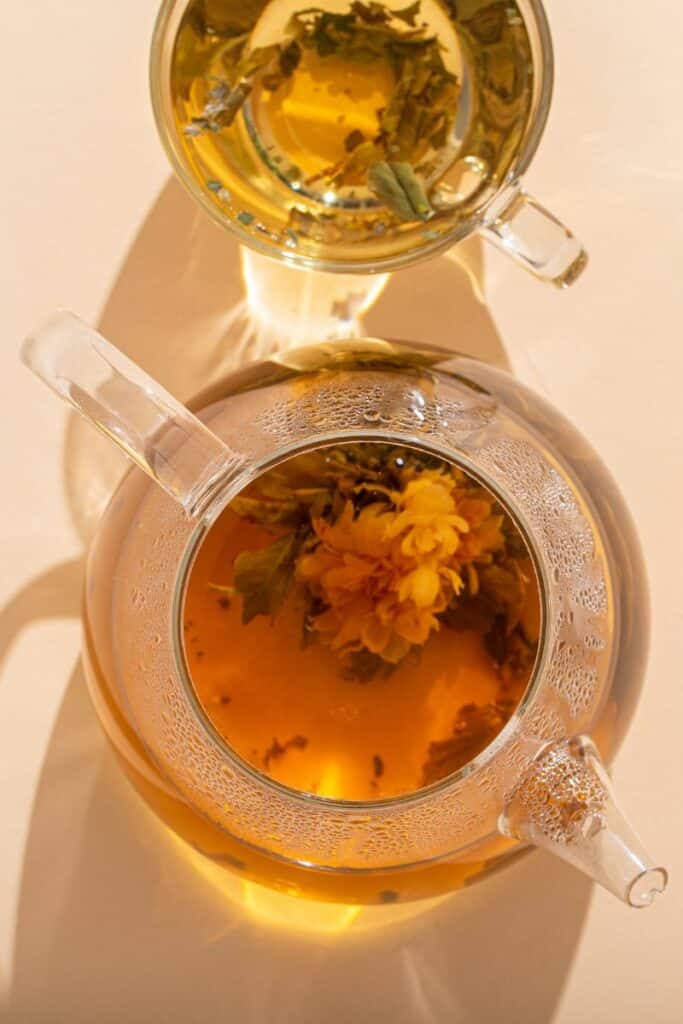
Disclaimer: This is not medical advice. Information and statements shown here are for educational and informational purposes only and are not to replace the advice of your healthcare professional.
This post may include affiliate links. Please refer to our disclaimer for full disclosure.
During pregnancy and the postpartum period, it's essential to nourish your body with the right nutrients to support both you and your baby. This is where herbal tea blends come in as a comforting way to provide essential nutrients. Herbal teas made from organic herbs have a long history of use for pregnant women, especially new moms navigating their breastfeeding journey, mood swings, and lack of sleep.
Herbal teas are a good way to supply your body with vitamins and minerals like vitamin C, iron, and calcium, which support overall health. They also have nervine herbs, like chamomile tea and peppermint tea, that help calm the nervous system, promote relaxation, and even support digestion. For new mamas, drinking a warm cup of tea is a great product to enhance milk supply, manage mood swings, and replenish energy during this special postpartum period.
Why Herbal Tea is Beneficial During Pregnancy and Postpartum
Herbal tea blends offer new moms and pregnant women a natural and gentle way to support their bodies. Using organic herbs provides essential nutrients and promotes overall health during pregnancy, the postpartum period, and the breastfeeding journey.
During pregnancy, herbs like red raspberry leaf and nettles are known to help with hormonal balance, provide vitamin C, and support blood circulation. These herbs are a good way to strengthen the uterus and prepare the body for birth, especially during the third trimester.
In the postpartum period, herbal teas can also increase milk supply and boost the immune system, helping with recovery from blood loss and reducing mood swings. Ingredients like chamomile tea and peppermint tea work as nervine herbs to calm the nervous system, reducing stress and promoting better sleep.
Herbal teas are a comforting way to add essential nutrients without the need for dietary supplements. Drinking a warm cup of tea, especially with a touch of honey, is a great product for new mamas looking for a soothing ritual that helps with energy and milk production. It’s important to consult with a healthcare provider before adding any new herbal remedy to your new regimen, especially if you have a medical condition or are taking any medications.
Key Herbs in the Recipe and Their Benefits
1. Red Raspberry Leaf
Red Raspberry Leaf is highly regarded for its ability to tone the uterus, making it an excellent choice during pregnancy and for postpartum recovery. This herb helps strengthen uterine muscles, promoting more efficient labor and reducing excessive bleeding after childbirth. It also contains vitamins A, C, E, and B-complex, which support immune system function and boost energy levels during the postpartum period.
Benefits:
- Tones the uterus, supporting a smoother labor.
- Reduces postpartum bleeding.
- High in iron, vitamins A, C, E, and calcium.
Good for: Pregnant women needing more nutritive support and new moms for postpartum healing.
2. Nettle
Nettle is a nutritional powerhouse, especially for its high iron content, which helps prevent anemia, a common concern for both pregnant women and new moms. It supports healthy blood circulation, boosts energy levels, and enhances milk supply during breastfeeding. Nettle is also rich in calcium, magnesium, and other vital minerals that help rebuild the body after pregnancy.
Benefits:
- Prevents anemia by providing iron.
- Increases energy and vitality.
- Promotes milk production for breastfeeding mothers.
- Rich in iron, calcium, magnesium, and vitamins A, C, K.
Good for: Boosting energy, supporting recovery, and improving milk supply.
3. Oat Straw
Oat Straw is well known for its calming effects and its ability to soothe the nervous system. This makes it an ideal herb for reducing stress and managing mood swings, especially during the postpartum period when many new mamas experience emotional fluctuations. Oat straw is rich in calcium and magnesium, which also support bone health and aid in recovery from childbirth.
Benefits:
- Calms the nervous system, reducing anxiety.
- Supports bone health with calcium and magnesium.
- Promotes relaxation and better sleep, helping with lack of sleep.
Good for: Reducing stress, promoting relaxation, and supporting postpartum recovery.
4. Alfalfa
Alfalfa is packed with vitamin K, which is essential for healthy blood clotting. This herb is also rich in iron, calcium, and vitamins A and C, providing key nutrients to help replenish the body after childbirth. Alfalfa is also known to help boost milk supply and strengthen the immune system.
Benefits:
- Provides vitamin K to support healthy blood clotting.
- Boosts milk supply and provides essential nutrients (vitamin K, iron, calcium to name a few).
- Strengthens the immune system and promotes overall wellness.
Good for: Preventing postpartum bleeding, enhancing milk supply, and boosting nutrition.
Find this exact blend here - Materni-Tea Herbal Tea
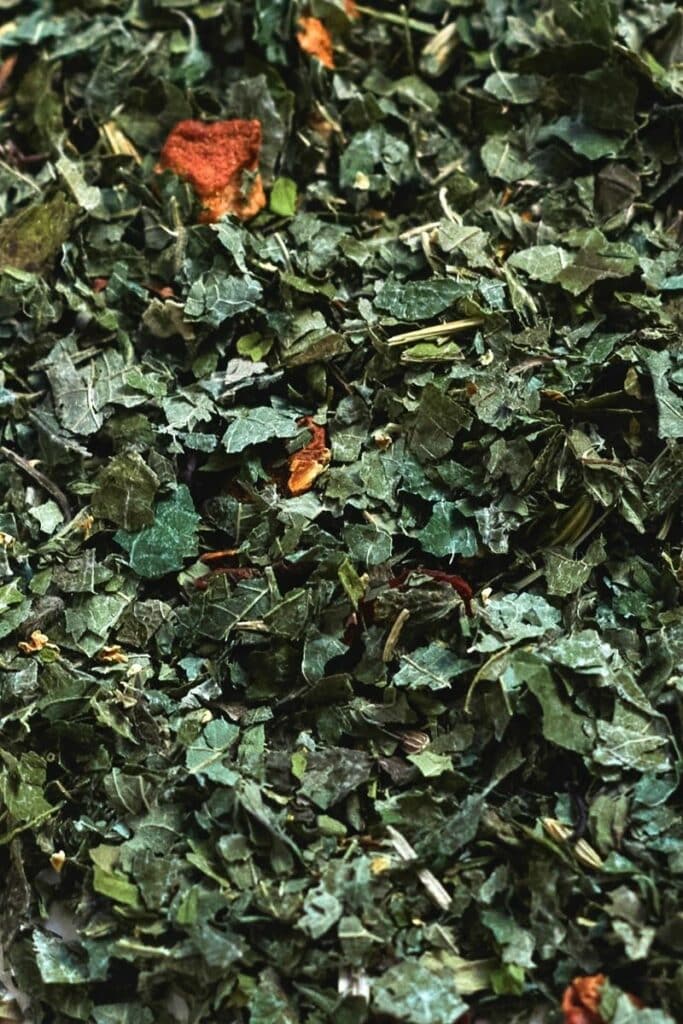
Nourishing Pregnancy and Postpartum Herbal Tea Recipe
This herbal tea recipe is designed to nourish and support the body during pregnancy and postpartum. Using loose leaf herbsallows for maximum potency and flavor, ensuring that the body benefits from all the nutrients and healing properties of the herbs.
Ingredients:
- 2 parts Red Raspberry Leaf
- 1 part Nettle
- 1 part Oat Straw
- 1 part Alfalfa
Step-by-Step Instructions:
- Mix the Herbs:
- In an airtight container or a glass jar, combine 2 parts red raspberry leaf with 1 part nettle, 1 part oat straw, and 1 part alfalfa. This will ensure the herbs stay fresh and potent for future use.
- Measure Your Serving:
- For each cup of tea, add 1 tablespoon of the loose leaf blend into a tea infuser, reusable tea bag, or simply place it directly in the water if you plan to strain it afterward.
- Boil the Water:
- Bring 1 cup of water to a rolling boil. This is the ideal temperature to extract the vitamins and minerals from the herbs.
- Steep the Tea:
- Pour the boiling water over the herbs and cover the cup. Let the tea steep for 15-20 minutes. Covering the tea ensures that all the beneficial compounds, especially the volatile oils, are retained for maximum potency.
- Strain and Enjoy:
- If using loose herbs directly in the water, strain the tea using a fine mesh strainer or squeeze the tea bag to extract the remaining liquid. If you used a tea infuser, simply remove it.
- Suggested Serving:
- Drink 1-3 cups daily for best results. You can also prepare a larger batch in a pitcher of tea and store it in the fridge for up to 24 hours.
- Optional Add-ons:
- Add a touch of honey or fresh mint for added flavor and benefits.
Storage:
- Store the loose leaf blend in an airtight container to preserve freshness and potency. Ensure the herbs are kept in a cool, dark place to extend their shelf life.
This herbal tea recipe for pregnancy and postpartum is a good way to naturally support the body's health during these stages.
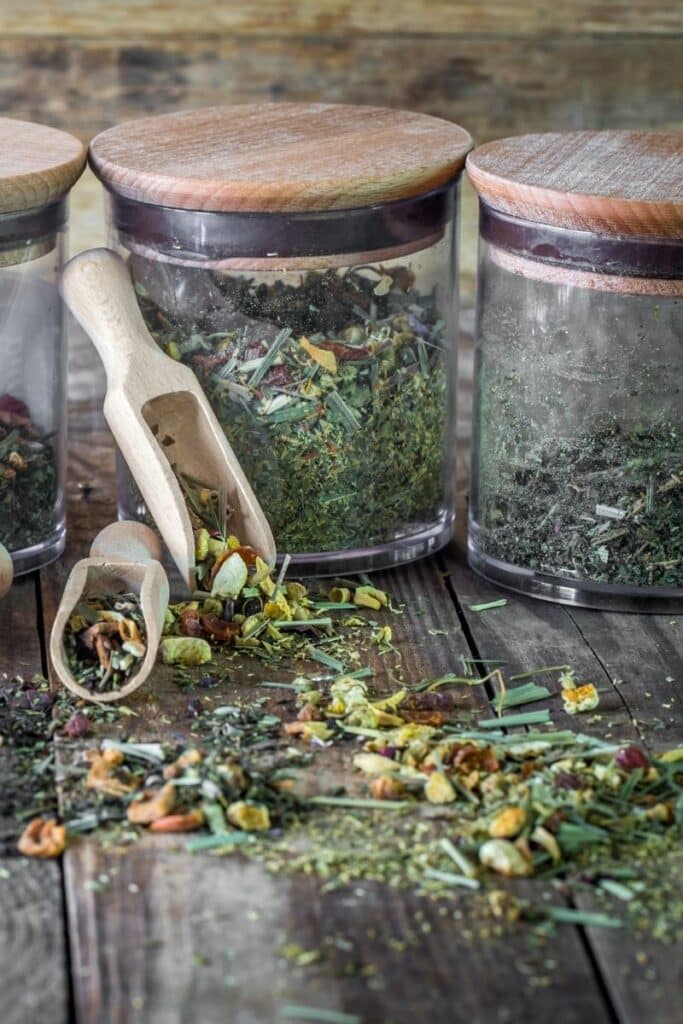
When and How to Use This Tea
Pregnancy: Best Time to Drink Pregnancy Tea
For best results, it’s recommended to start drinking this herbal tea blend in the second trimester. By this point, the body is preparing for labor, and the herbs in the tea, like red raspberry leaf, are known to tone the uterus, helping prepare it for delivery. Drinking 1-3 cups daily during the second and third trimesters supports hormonal balance, energy levels, and nutrient replenishment, especially as the baby grows and your body’s demands increase.
How to Drink:
- 1-3 cups per day, starting in the second trimester and continuing into the third trimester.
- Drink in the morning or throughout the day for an energy boost, as herbs like nettle provide essential vitamins and minerals.
- Add a touch of honey or fresh mint for extra flavor and soothing benefits.
Postpartum: How to Drink Postpartum Tea
After childbirth, this tea can be used daily to support postpartum healing, increase milk production, and aid in balancing hormones. The combination of nettle and alfalfa provides vital nutrients for replenishing iron and calcium lost during delivery, while red raspberry leaf supports the uterus in returning to its pre-pregnancy state.
How to Drink:
- Drink 1-3 cups daily throughout the postpartum period to aid in recovery and support breastfeeding.
- Sip warm tea during nursing sessions to promote relaxation and stimulate milk flow.
Tips for Brewing Stronger Infusions
For a more potent brew:
- Make a stronger infusion by steeping the tea for 30 minutes to 1 hour or creating an overnight infusion by letting the herbs sit in hot water for 6-8 hours.
- This method is especially helpful when you need extra support for healing or energy.
Optional Herbs to Add:
- Chamomile: Add chamomile tea to the blend for its calming properties and to help with relaxation and better sleep.
- Lemon Balm: This herb can be included for its ability to reduce stress and anxiety, and promote better mood balance, which is especially beneficial during the postpartum period.
This tea can be an essential part of your new regimen during pregnancy and postpartum, offering a comforting way to nourish the body.
Frequently Asked Questions
Is this tea safe throughout pregnancy?
Yes, this herbal tea blend is generally safe during pregnancy, especially starting in the second trimester. Red raspberry leaf, a key ingredient, is often recommended in the later stages of pregnancy to help tone the uterus and prepare it for labor.
Can this tea boost milk production?
Yes, this tea can help boost milk supply during the postpartum period. The nettle and alfalfa in the blend are known to enhance milk production by providing essential nutrients like iron, calcium, and magnesium, which are beneficial for breastfeeding mothers. Regular consumption during your breastfeeding journey can help support your body's nutritional needs and encourage healthy milk flow.
How long can I store the herbal blend?
You can store the loose leaf herbal blend in an airtight container for up to 6-12 months. Ensure that the herbs are kept in a cool, dry place away from direct sunlight to preserve their potency and freshness. Once brewed, the tea can be stored in the refrigerator for 1-2 days if you make a larger batch in a pitcher of tea.
Conclusion
This nourishing herbal tea blend offers a gentle and natural way to support both pregnancy and postpartum recovery. With herbs like red raspberry leaf, nettle, oat straw, and alfalfa, this tea provides essential vitamins and minerals that promote uterine health, boost energy levels, and enhance milk supply for breastfeeding mothers.
Drinking 1-3 cups daily can help tone the uterus, prevent blood loss, balance hormones, and support overall wellness. Whether you're preparing for labor or focusing on postpartum healing, this tea is a comforting way to nourish your body.
